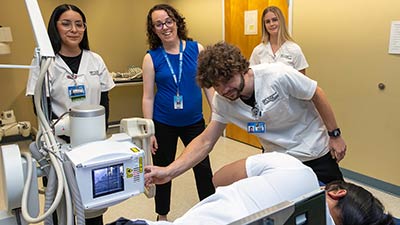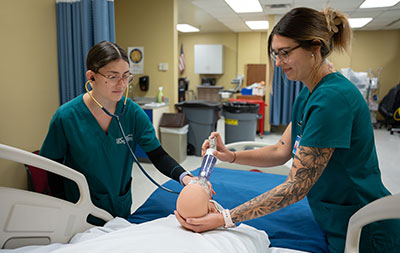6 Types of Nursing Degrees & Certifications
SPC Marketing | 2/21/2025

Those looking to pursue a career in nursing have an array of degrees and certifications to choose from, each tailored to meet the needs of patients and larger healthcare systems. From entry-level roles providing direct care to advanced positions managing medical research, each educational path prepares nurses for responsibilities and career opportunities that truly make a difference.
In this blog post, we'll explore six key nursing degrees, providing an overview of what each entails, the skills required and the career prospects they offer. Whether you're just beginning your journey in nursing or seeking to advance your career, this guide will help you understand which degree aligns best with your goals.
An Introduction to Nursing Degrees
Just as the medical field has a range of specialties and practices, so does the nursing profession, with different degrees and certifications to meet the many needs of patients.
Each level of education prepares students for distinct roles, from providing direct patient care to managing complex medical scenarios. This tiered approach ensures that there are qualified professionals for every aspect of nursing.
The following list includes some of the most prominent types of nursing degrees, highlighting the unique skills and opportunities each one offers to help you choose the path that best suits your goals.
Overview: 6 Types of Nursing Degrees
Your ideal nursing role begins with understanding the various degrees available and how each one aligns with different professional goals.
Whether you're just starting out or want to advance in the field, this overview will guide you through the key nursing degrees, outlining what each entails and the career opportunities they can lead to.
Note: Timelines and program requirements can vary based on individual circumstances, program length and state-specific requirements.
Certified Nursing Assistant (CNA)
Overview: This entry-level healthcare professional typically cares for patients in hospitals, long-term care facilities and nursing homes. CNAs work closely with nurses, providing essential medical support and handling important administrative tasks such as stocking supplies, updating patient records and ensuring high-quality patient care.
Education Requirements: Earn a high school diploma or GED; Pass a state-specific CNA training program; Pass written and clinical portions of state exam.
Timeline: Most programs last 4 to 12 weeks, followed by at least 75 hours of clinical training.
Career Path: With additional training and hands-on experience, CNAs can advance to roles such as Licensed Practical Nurse (LPN) or Registered Nurse (RN), which offer more responsibilities and higher salaries. Every two years, CNAs must complete a minimum of 48 hours of continuing education to become recertified.
Licensed Practical Nurse (LPN)
Overview: LPNs are largely responsible for basic medical care, such as monitoring patient health and assisting higher-ranking medical professionals during procedures. The role is crucial in hospitals, nursing homes and clinics for administering medications, collecting samples for testing and assisting with patient hygiene.
Education Requirements: Earn a high school diploma or GED; Complete a vocational training course; Pass the National Council Licensure Examination for Practical Nurses (NCLEX-PN).
Timeline: The process takes at least a year, from completing a training program at a community college or technical school to preparing for and passing the NCLEX-PN. The exam can be retaken 45 days after a failing grade.
Career Path: Many LPNs choose to advance their careers by pursuing additional education, such as becoming an RN through bridge programs (LPN to RN), which can provide more opportunities and higher earning potential.
Associate Degree in Nursing (ADN)
Overview: This is an entry-level nursing degree designed to equip students with the skills needed to become Registered Nurses (RNs). This program provides a well-rounded nursing education, focusing on areas like patient care, medical ethics and healthcare technology. By combining theoretical coursework with practical clinical experience, ADN programs prepare graduates to deliver top care in a range of healthcare environments.
Education Requirements: A high school diploma or equivalent to enroll; Coursework typically consists of anatomy, physiology, microbiology, pharmacology and nursing theory; Clinical rotations in hospitals and other healthcare facilities.
Timeline: An ADN degree is typically earned in a two-year program at a community college. Some schools offer accelerated options that can be completed in about 18 months.
Career Path: After earning an ADN, graduates are eligible to take the NCLEX-RN exam to become a licensed RN. RNs with an ADN can work in various healthcare settings, including hospitals, nursing homes, outpatient clinics and home healthcare. Many RNs with an ADN choose to pursue a Bachelor of Science in Nursing (BSN) through an RN to BSN program, which is specially designed to build on existing knowledge and experience to earn an advanced degree faster.
Bachelor of Science in Nursing (BSN)
Overview: A BSN is an undergraduate-level nursing degree that delves into more complicated topics, including healthcare technology, research and health promotion, in addition to advanced patient care. Earning a BSN prepares students not only for clinical nursing roles but also for leadership positions, specialized nursing roles and higher-level responsibilities within the healthcare field.
Education Requirements: To enroll, a cumulative GPA of 2.75 or higher in high school or associate degree program, plus at least a 2.5 GPA in science courses; Then, complete undergraduate curriculum in the classroom and field; Pass the NCLEX; Apply for licensure with state board.
Timeline: The traditional timeline for a BSN is four years, however, those with an associate degree in nursing can opt for an RN to BSN program, which can take half the time to complete. At St. Petersburg College this program is available completely online, allowing employed RNs to enroll in courses that align with work schedules.
Career Path: A BSN opens doors to a wide range of nursing careers, including roles in acute care, public health and specialty areas such as pediatrics, oncology and critical care. BSN-prepared nurses are also well-positioned for leadership and management roles.
Master of Science in Nursing (MSN)
Overview: This specialized graduate degree is for RNs aiming to enhance their skills, take on leadership positions or focus on particular areas of nursing practice. The MSN program provides in-depth education in advanced clinical practice, nursing leadership, healthcare policy and research methodologies. It equips nurses for various advanced roles, such as nurse practitioners, nurse educators and nurse administrators.
Education Requirements: It’s important to review each school’s specific requirements, but most programs require a bachelor’s degree, plus a personal statement, GPA, letters of recommendation and relevant clinical experience; Course requirements in advanced nursing, research and specialty areas; Clinical practicum or capstone project.
Timeline: An MSN program usually takes two to three years to complete, depending on full-time or part-time attendance. Some programs offer accelerated options for students with extensive clinical experience or an especially strong academic background.
Career Path: Graduates with an MSN are typically eligible for advanced healthcare roles, such as Nurse Practitioners (NPs), Clinical Nurse Specialists (CNSs), nurse educators, nurse administrators or nurse leaders. An MSN also provides a strong foundation for those wishing to pursue further advanced degrees.
Doctor of Nursing Practice (DNP)
Overview: This top-tier program is tailored for nurses who want to excel in high-level roles within clinical practice, leadership or academia. The degree emphasizes advanced clinical practice, research and the implementation of evidence-based strategies to enhance patient care and healthcare systems. The Doctor of Nursing degree typically includes a strong focus on managing complex patient care, shaping healthcare policy and leading organizational initiatives. DNP programs offer a practical alternative to research-oriented doctoral programs, like Ph.D. in Nursing degrees.
Education Requirements: To be a candidate, complete an MSN or related advanced degree, plus hold a current RN license; Program involves advanced coursework in nursing science, research methodologies, healthcare policy and leadership; Dissertation or capstone experience.
Timeline: Expect to invest three to five years in either a full- or part-time Doctor of Nursing program.
Career Path: Opportunities are vast with a Doctor of Nursing degree, including advanced practical roles, such as nurse practitioner (NP), nurse anesthetist, nurse midwife or nurse educator. Executive-level positions in hospital or care facility management, governmental agencies and leading research positions are also possibilities.
Nursing Degree Comparison
Choosing the right nursing degree is key to shaping your career. Here’s a straightforward approach to help you decide based on your career goals, degree requirements and return on investment.
- Define Career Objectives
Start by clarifying your long-term career goals. Are you aiming for a direct patient care role, a leadership position, or a role in academia or research? Each nursing degree offers its own distinct career pathway that leads to a wide range of opportunities. - Understand Degree Requirements
Each degree comes with its own set of educational and experiential requirements. Be sure to research the specific prerequisites and coursework requirements of each degree to help you make the most informed degree decision. - Assess Return on Investment (ROI)
Any nursing degree you pursue will require time, effort and financial commitment. In general, you can count on a high ROI because of the consistent need for well-educated healthcare professionals, competitive salaries and a range of career opportunities that offer stability and growth potential. There are numerous scholarships available to help offset the cost of tuition, and many employers offer tuition reimbursement programs to support educational goals. - Evaluate Personal and Financial Circumstances
Closely examine your financial situation and personal commitments before committing to a nursing degree. This could mean opting for a degree that is less expensive but takes longer to complete or enrolling in an accelerated program to join a strong job market sooner. These personal factors will make all the difference in your educational experience and can mean the difference between achieving your goals and needing to pivot for substantial challenges. - Seek Guidance From Your Network and Professionals
Medical professionals have been where you are, and they can often provide valuable insights as you navigate the journey toward a fulfilling career of your own. Additionally, it’s wise to consult with close family and friends, educational advisors, financial planners and others who understand your personal circumstances. Their perspectives can provide tailored guidance and support as you make decisions about your future. - Analyze and Decide
The next crucial step is to analyze your findings and make an informed decision. Review all of the important information you’ve collected, weigh the pros and cons, consider your long-term goals and make the most informed decision possible. Once you’ve made your choice, you’re ready to start the application process.
FAQs
Which degree is best for nursing?
The best nursing degree largely depends on individual circumstances, educational background and career goals. Degree options vary greatly, from entry-level programs that can be completed sooner to advanced degrees that require up to five years of commitment.
How many degrees are there in nursing?
There are many degree options available in the nursing field. Six of the most common options include: Certified Nursing Assistant (CNA), Licensed Practical Nurse (LPN), Associate Degree in Nursing (ADN), Bachelor of Science in Nursing (BSN), Master of Science in Nursing (MSN) and Doctor of Nursing Practice (DNP).
What is a two-year nursing degree called?
A two-year nursing degree is called an Associate Degree in Nursing (ADN). This degree prepares graduates to become Registered Nurses (RNs) and provides the foundational skills and knowledge needed for entry-level nursing positions.
Ready to pursue your dream career? Learn more about nursing programs at St. Petersburg College.



